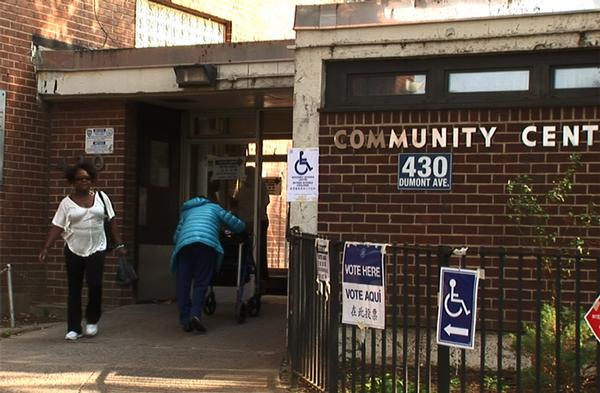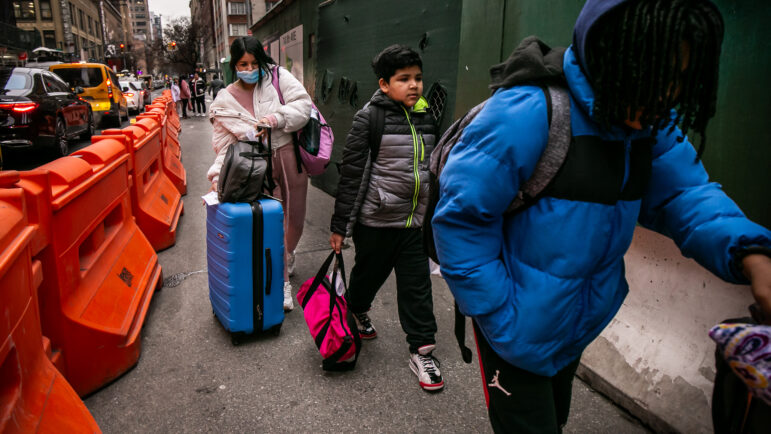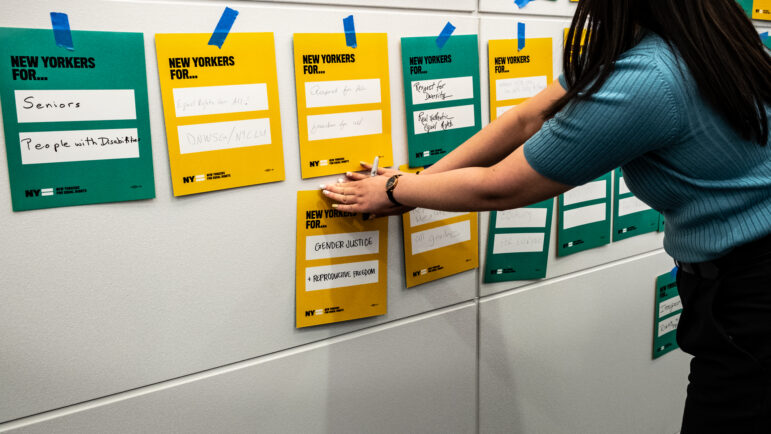
Photo by: Kirsti Itameri
In the City Council district of which Brownsville is part, there was an increase of 44 percent in total votes cast last Tuesday compared to 2009’s primary.
This article is an installment in The Five Borough Ballot, a collaboration between City Limits, City & State and WNET’s MetroFocus. In each edition of the print and video series, we return to a location in each of the five boroughs to ask real New Yorkers their take on the 2013 election as it unfolds. For a complete overview of the series, go here
On most election days, when the residents of her building and a few surrounding blocks head to the Van Dyke Senior Center on Dumont Street to vote, Lisa Kenner is out in front of the polling site with a bullhorn, urging her neighbors to vote. But last Tuesday Kenner left her amplification at home. None of the candidates had excited her enough to shout.
“I liked Weiner because he had good ideas and stuff,” she said as she sat outside the polling place, a slow trickle of voters heading in and out. “He had the nerve to call me, and I have the nerve to stay on the phone,” she added, referring to a so-called telephone town hall she participated in. But Weiner’s Twitter transgressions couldn’t be forgotten. “When you run for office, you can’t have a blemish like that.”
Kenner wouldn’t say whom she voted for in the mayor’s race. She strongly hinted that she supported the incumbent in the contest for district attorney. “You know what you’ve got,” she said of Charles Hynes, who was defeated after 23 years in office by Kenneth Thompson. “You don’t know what you’re getting. Hynes has implemented programs that would change people’s lives, if they used them. Who’s Ken Thompson? I’d never heard of him.”
While other voters interviewed were less ambivalent than Kenner, most said they hadn’t come to the polls with a strong sense of who they’d support.
“I’ve been seeing those four people on TV for the last few months,” said Ann Simmons, who has lived in the neighborhood for 45 years. “I really decided when I got into the booth.” Asked if she was typically a last-minute decider, Simmons said no. “I really had never heard of Bill de Blasio until this campaign started. I think his family intrigues me a little bit. But at the end of the day that wasn’t as important as I thought it was.” For her, the most important issue is education. “The schools are very important to me,” she said. “My kids made it. But then there are some kids—the ones not making it—that could have been my kids.”
Robin Alexander also didn’t make up her mind until she’d closed the voting-machine curtain. Why had it taken her so long to choose? “I think it’s just the fact that you’re not sure who you pick is going to really do what they’re saying.” The important thing wasn’t the difference in the candidates’ platforms, but the extent to which she felt she could trust any of them. For her, the most critical task for the next mayor is “making sure people are able to get a job and not just be on welfare forever.” A Department of Education employee, she also wants the mayor to “just make sure the public schools are run correctly. Get books, so teachers don’t have to go out of pocket. “
Doris, who sat with one arm leaning on her walker and didn’t provide her last name, had a unique method for picking a candidate. “I was looking at who was in front of who, how the percentages were on TV. That helped me a little bit,” she said. “I voted for who was ahead.” Then she added, “I intended to vote for him anyway.”
A woman came bounding out of the building having voted, waving good-bye to friends. Two minutes later she strode back with a younger woman in tow. “Her vote counts, right?” she asked the ladies on the benches outside. “Right, right,” they replied.
A few minutes later a beaming Calvin Davis came “I’m telling y’all, Bill Thompson! He’s gonna go all the way.”
“I’m not a registered voter, but my homegirl did [vote for Thompson],” Davis said, who said he is planning on registering but hasn’t yet. The question he thinks candidates must answer is “Who’s going to clean up the streets?”
“I’d just try to vote for the Democrat, because they stand for something good. Republicans stand for white people—making them richer,” Davis continued. He wants to see programs and centers for young people. “This place is bad,” he said, gesturing to the neighborhood, which he said was home to a lot of crime and many negative people. He used to sell drugs himself. “After a while it makes you want to change because you see so much bad out here,” he said.
According to preliminary results, Bill Thompson did not go all the way, even at the Van Dyke Senior Center. The election district covering Kenner’s building went for de Blasio by a 51 to 29 percent margin (followed by Weiner at 9 percent, Liu at 6 percent and Quinn at 5 percent). The total for all three election districts that poll at the senior center was 42 percent de Blasio, 39 percent Thompson, followed by Weiner at 8 percent, Liu at 6 percent and Quinn at 5 percent.








